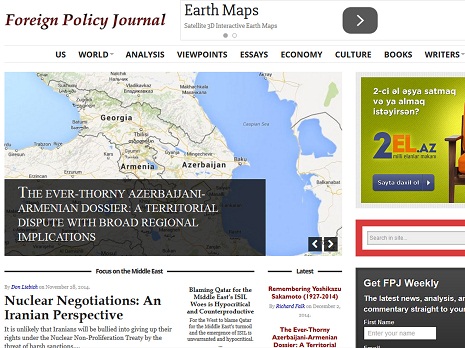The article said that Azerbaijan has nevertheless remained a crucial cog within the regional power map; to such an extent that many analysts have argued that Baku’s foreign policy would ultimately carry broad regional repercussions.
At this particular juncture in time, when Azerbaijan’s frictions with Armenia have increased in both intensity and frequency over the ever-thorny issue of territorial sovereignty and border demarcation, the Caucasus could soon become a regional cesspit, Shakdam said.
Analyst Fariz Ismailzade is quoted in the article as saying that “This is a conflict which has the danger of pulling in major regional powers.”
He said that “The Nagorno-Karabakh conflict is a hostage to geopolitical rivalry, and it is clear that the conflict has more players than just Yerevan and Baku.”
Indeed, such powers as Russia, Iran, Turkey, the United States and the EU have geostrategic interests invested in Azerbaijan, the article said.
On November 28, the Azerbaijan Defense Ministry issued an official statement in which it condemned Armenia’s belligerent actions against Baku, emphasizing the constant violation of a ceasefire, said the article.
While Azerbaijan has so far refused to engage Armenia militarily, Baku has warned that further encroachment on its territory would be met with utmost speed and resolution, Shakdam`s article said.
With tensions and resentment in between Azerbaijan and Armenia building back up again, experts have already warned that timing could prove disastrous for the region as another war would force world powers to engage at a time of great unrest and over-lapping foreign agendas, the article said.
Mohsen Kia, an Iranian political analyst is quoted in the article as saying that “just as Syria became center-staged to foreign rivalries, a new Caucasus war could unravel the status quo and force regional powers to dig in their political and military heels.”
Shakdam said that Ankara is a staunch ally of Baku. Turkey was first in the world to recognize Azerbaijan’s independence in 1991 and it has since worked to bolster state independence through active military and economic support, she said.
“Even back in 2005, Fariz Ismailzade said that Azerbaijan and Armenia are part of a region that serves as a bridge between East and West, the former Soviet Union countries and the Islamic world,” the article said. “This often causes a bitter rivalry of many regional powers. As a result, the Nagorno-Karabakh conflict remains frozen and unresolved.”
The author said that Ismailzade’s assessment is valid today as well.
In the light of developments in Syria, Iraq and renewed Taliban-related tensions in Afghanistan, Islamic radicals could attempt to play Armenia’s aggression toward Azerbaijan as a new platform for their Jihadist movement, adding a terror dimension to an already delicate situation, Shakdam said.
“As Armenia and Azerbaijan’s hands remain on the trigger, it could well be the region that stands to get caught in the cross-fire,” the author said.
More about:















































